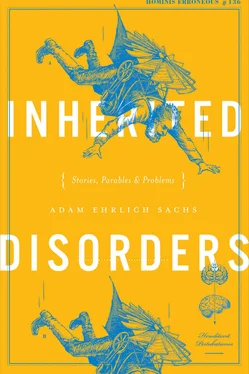Soon the madman had talked to everyone worth talking to, seen everything worth seeing, thought about everything worth thinking about, and yet again was left bored and lonely. Even the company of geniuses wasn’t enough; boredom would always be with him, he realized, as long as he had this huge, historic intelligence. Suicide was the only way out. He decided to commit suicide by paradox. He would go back in time and kill his own grandfather — a logical impossibility, as we all know, he said, since killing his grandfather would mean he himself wouldn’t be born, which would mean he couldn’t go back in time to kill his grandfather. So this might be interesting, he said. Plus, he said, he would get to murder the man who’d handed down to him this huge, horrible, historic intelligence.
The madman set his time machine for 1932 Berlin, where his grandfather was a promising Expressionist painter. He materialized in his grandfather’s studio with a gun. “ Nein! ” his grandfather yelled, raising his paintbrush, the madman told the psychiatrist. “ Nein! ” He aimed his pistol. His grandmother ran in. “ Nein! ” she said, according to the madman. “ Nein! Nein! ” He fired into his grandfather’s chest and the promising Expressionist painter fell over dead.
But the madman didn’t disappear. Nor, he said, did the universe implode.
Was there no paradox after all?
As his sobbing grandmother ran over to his dead grandfather, the madman noticed the slight swell of her belly. Ah! he realized, as he recalled to the psychiatrist. She was already pregnant!
That instant the madman vanished from the studio and materialized naked under an overpass in the cardboard box labeled TIME MACHINE. The real time machine was gone. For a moment he was confused. Then everything became terrifically clear. His father had still been born, but now fatherlessly, and his life had gone, instead of well, poorly; instead of becoming a mathematician, he’d become an underemployed roofer. His son, the madman, had no longer grown up in an intellectual milieu. Instead of becoming brilliant beyond bounds, said the madman with evident relief, he had become stupid, and even a little bit insane. And obviously in this alternate universe he was totally and utterly incapable of building an actual functioning time machine.
“Look at it now!” the madman cried joyfully. “A cardboard box!”
77: FLEISCHMAN’S PREDICAMENT
…………………….
Fleischman, the film critic’s son, once explained his predicament to me.
His great-grandfather rebelled against his great-great-grandfather over the issue of Judaism; his grandfather rebelled against his great-grandfather over the issue of Marxism; and his father rebelled against his grandfather by becoming a film critic.
The family business, Fleischman realized, is rebellion! He was even expected by his father, the film critic, to rebel! Thus, he realized, as he put it to me over lunch at the Pakistani restaurant in our neighborhood, the only way he could actually rebel would be not to rebel at all .
By rebelling he would not be rebelling, but by not rebelling he would be rebelling. The Fleischman predicament, he declared.
This was why he was making himself over in his father’s image. If I was wondering why he was wearing one of his father’s old suits and his father’s old glasses, with the prescription lenses popped out and plain glass put in, Fleischman told me at the Pakistani place, this was why. This was why he was writing unpaid film reviews for our town’s free alternative newsweekly. And had I noticed, he wanted to know, that he had even adopted many of his father’s speech patterns? “These words are his words!” cried Fleischman excitedly. “It is even possible that these thoughts are his thoughts!” He had also, he said, perfected his father’s laugh. He showed me this laugh at some length. By becoming his father, he was, ironically, becoming his own man, Fleischman explained, laughing his father’s laugh.
Needless to say, I turned down all future lunch invitations from Fleischman. His father called a few months later to inform me that Fleischman was being hospitalized. I got an enthusiastic voicemail from Fleischman the same night, calling from the asylum. He said that his father’s failure to recognize his actions as nothing more than a form of rebellion was a sign that he was rebelling — or rather not rebelling — properly. I need to keep doing exactly what I’m doing, Fleischman said, and then hung up.
…………………….
A soft-spoken Balkan historian at our college was inordinately sensitive to the subtle means by which power operates. For reasons that were never completely clear, he was absurdly careful not to influence us intellectually — consciously or subconsciously — in any way, and always strove in his lectures to separate his Balkan facts from his Balkan interpretations . At first we assumed this was just his pedagogical philosophy, but later, when it became so clearly pathological, we suspected that it might be connected to his upbringing. (His father was, depending on whom you asked, a Serbian war criminal, a Macedonian statesman, a Croatian optician, or a Bosnian cobbler.)
In any case, the Balkan historian finally broke down during the third of his three lectures on the Congress of Berlin when he realized that he could not give us a single fact about the Congress of Berlin without also impressing upon us, implicitly or explicitly, his judgment or interpretation of it, even if the judgment was simply that it was a fact worth knowing. In the end, he was reduced to stating again and again the dates during which the Congress took place— June 13 to July 13, 1878 —while inserting intermittently that it was “entirely up to [us]” whether or not we considered these dates to be of any importance.
He resigned his appointment that day and later drowned himself in a local lake. According to a note, he was horrified by the number of students he had unintentionally influenced and imprinted himself on over the years. How could he bear the guilt of his Balkan history thoughts occupying their heads? (We were confused: we had signed up for the course as much for his thoughts as for his facts.) Only by drowning himself, he wrote, could he prevent himself from ever insidiously influencing another student. Unfortunately, the lake in which he drowned himself was also, unbeknownst to him, a reservoir, and soon the entire college population was virulently ill.
…………………….
Visitors to the San Antonio Zoo have long been moved by the sad sight of Samson, an elderly African elephant who spends some fourteen hours a day pushing a huge tractor tire in a circle around his enclosure, moaning the entire time.
Rumor spread that Samson was in mourning for his son, transferred many years ago to another zoo.
His zookeepers, who knew that Samson had never had children and was simply driven insane by the conditions of his existence, thus had a decision to make. They could explain to the public that Samson moaned and pushed his tractor tire in a circle because he was deranged, or they could let the public continue thinking that he did so because he was deranged by grief .
Needless to say, they went with the second option. They even nailed a sign beside Samson’s pen describing the exceptionally close-knit nature of the elephant family unit.
This seeming confirmation of Samson’s circumstance has attracted more visitors to his enclosure than ever before. They crowd around him. He moans and pushes his huge tractor tire. “A father driven to grief by the loss of his son,” they think, never suspecting that he’s just a berserk bachelor totally unhinged by every single aspect of his life.
Читать дальше












